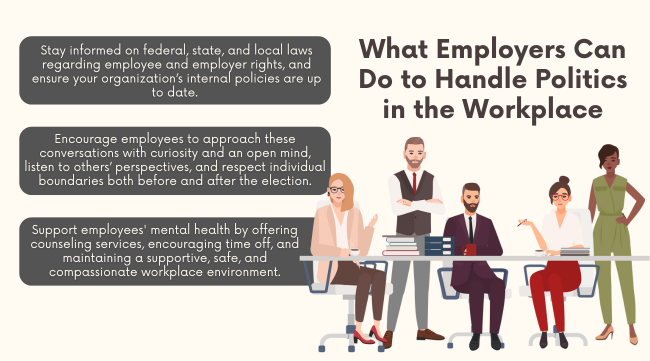
We are less than two months away from a highly contentious presidential election, and as Election Day approaches, tensions continue to rise. While opinions differ on whether politics should be discussed openly in the workplace, the reality is that the topic is hard to ignore. As an employer, preparing your organization to navigate this politically charged environment is vital.
Gone are the days when political discussions were considered inappropriate in the workplace. Election outcomes and legislation impact every facet of our professional and personal lives. Since the pandemic, the boundary between work and home life no longer exists, and with news being shared instantly through social media, political conversations are bound to arise.
A critical factor employees consider when evaluating potential employers is how the company’s mission, values, and culture align with their own — and that includes political beliefs. According to ResumeBuilder, 23% of job seekers chose not to apply to a company based on its political stance. Additionally, a recent Indeed survey revealed that 40% of employees between 18 and 34 would leave a job due to political differences. However, the topic of politics in the workplace remains divisive. The Indeed survey found that 35% of employees have openly discussed politics at work, while 54% are uncomfortable with any political conversation during meetings.
If organizations want employees to comfortably bring their whole selves to work, they must create a space that fosters inclusivity, well-being, and psychological safety. This includes allowing room for constructive political discussions while protecting employees from backlash. Political topics can be highly emotional, and without the right approach, these conversations can become harmful. SHRM reported that 42% of workers had experienced political disagreements in the workplace, while 39% of employees in the Indeed survey reported harassment or discrimination based on their political views.
What employers can do to handle politics in the workplace
Labor and Employment law firm Littler recently published its 2024 Employer Survey, revealing that 87% of employers are concerned about managing divisive political and social beliefs among employees as the election nears. To help navigate this, here are some key steps:
- Laws and Policies: Stay informed on federal, state, and local laws regarding employee and employer rights, and ensure your organization’s internal policies (such as anti-discrimination, social media, and harassment policies) are up to date. Communicate these policies clearly to employees, and consider training management on relevant laws and how to handle potential conflicts.
- Establish Boundaries: Political discussions can be productive when approached with empathy and respect. Encourage employees to approach these conversations with curiosity and an open mind, listen to others’ perspectives, and respect individual boundaries both before and after the election.
- Provide Resources: Election results may provoke strong emotional reactions in employees. Be ready to support employees’ mental health by offering counseling services, encouraging time off to process emotions, and maintaining a supportive, safe, and compassionate workplace environment.

In today’s polarized political climate, navigating political discussions in the workplace is more important than ever. Employers can manage these complexities by fostering a respectful, inclusive culture and ensuring employees feel supported. By reviewing policies, training leaders, setting clear boundaries, and offering mental health resources, organizations can maintain a resilient, empathetic, and unified workforce throughout the election season and beyond.
Before you go, subscribe to The JOHNLEONARD Blog and receive the latest insights, trends, and tips in your inbox!
